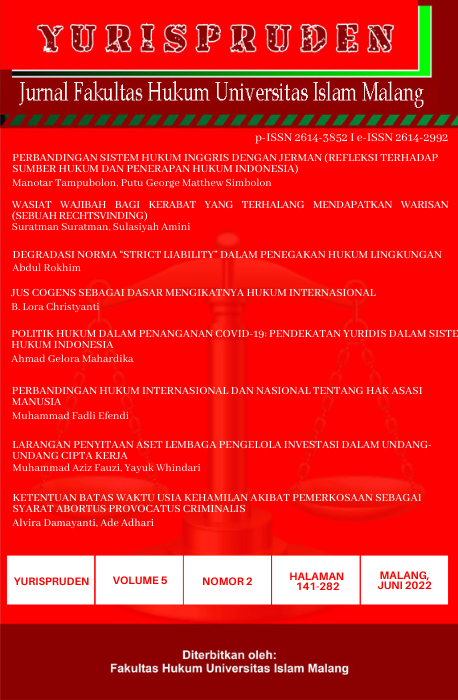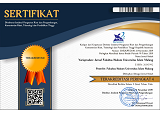Wasiat Wajibah Bagi Kerabat Yang Terhalang Mendapatkan Warisan (Sebuah Rechtsvinding)
DOI:
https://doi.org/10.33474/yur.v5i2.13731Keywords:
Mandatory Will, Inheritance, RechtsvindingAbstract
This paper was compiled with the aim of knowing the considerations of relatives who are prevented from getting an inheritance due to different religions through the mandatory will system and the position of the mandatory will in the perspective of Islamic law. The research method used is normative juridical. Based on the results of the study, it was concluded that consideration of relatives who were prevented from obtaining an inheritance due to different religions, still getting inheritance with a mandatory will system was carried out through the argumentum per analogium method. With a mandatory will, the Supreme Court has made a legal step and this is a rechtsvinding. Based on the perspective of Islamic law, the implementation of the mandatory will is in line with the understanding that Islam is a religion that has the aim of applying the principles of justice as stated in the Qur'an and Hadith.
References
Jurnal
Eko Setiawan, (November 2016–April 2017), Penerapan Wasiat Wajibah Menurut Kompilasi Hukum Islam (KHI) Dalam Kajian Normatif Yuridis, Muslim Heritage, Volume 1, Nomor 2.
Ilyas, (2015) Kedudukan Ahli Waris Nonmuslim terhadap Harta Warisan Pewaris Islam, Kanun Jurnal Ilmu Hukum, Volume ___, Nomor 65.
Muhamad Isna Wahyudi, (Desember, 2015), Penegakan Keadilan Dalam Kewarisan Beda Agama, Jurnal Yudisial, Volume 8, Nomor 3.
Rohmawati, (2018), Progesivitas Hukum Kewarisan Beda Agama di Indonesia Berbasis Keadilan dan Maslahah, International Journal Ihya’ Ulum Al-Din, Volume 20, Nomor 2.
Zulfia Hanum dan Alfi Syahr, (2016), Wasiat Wajibah Sebagai Wujud Penyelesaian Perkara Waris Beda Agama Dalam Perkembangan Sosial Masyarakat, Jurnal Holistik, Volume 1, Nomor 2.
Skripsi
Muammar Kadafi, (2019), Kedudukan anak yang berbeda agama dengan orang tuanya terhadap harta warisan berdasarkan kompilasi hukum Islam dan hukum perdata, Skripsi, Malang: Ilmu Hukum Fakultas Hukum Universitas Islam Malang.
Buku
Abdul Ghofur Anshori, (2017), Hukum Kewarisan Islam di Indonesia, Yogyakarta; Gadjah Mada University Press.
Eman Suparman, (1991), Inti Sari Hukum Waris Indonesia, Bandung; Mandar Maju.
Muchit. A Karim, (2012), Problematika Hukum Kewarisan Islam Kontemporer di Indonesia, Jakarta; Puslitbang Kehidupan Keagamaan Badan Litbang dan Diklat Kementerian Agama Republik Indonesia.
Nuruzzaman Shiddieqy, (1997), Fiqh Indonesia dan Gagasannya, Yogyakarta; Pustaka Pelajar.
Peter Mahmud Marzuki, (2008), Penelitian Hukum, Jakarta; Kencana Prenada Media Group.
Suratman dan Philips Dillah, (2015), Metode Penelitian Hukum, Bandung; Alfabeta.
Downloads
Additional Files
Published
How to Cite
Issue
Section
License
Copyright (c) 2022 Suratman Suratman, Sulasiyah Amini

This work is licensed under a Creative Commons Attribution 4.0 International License.

















